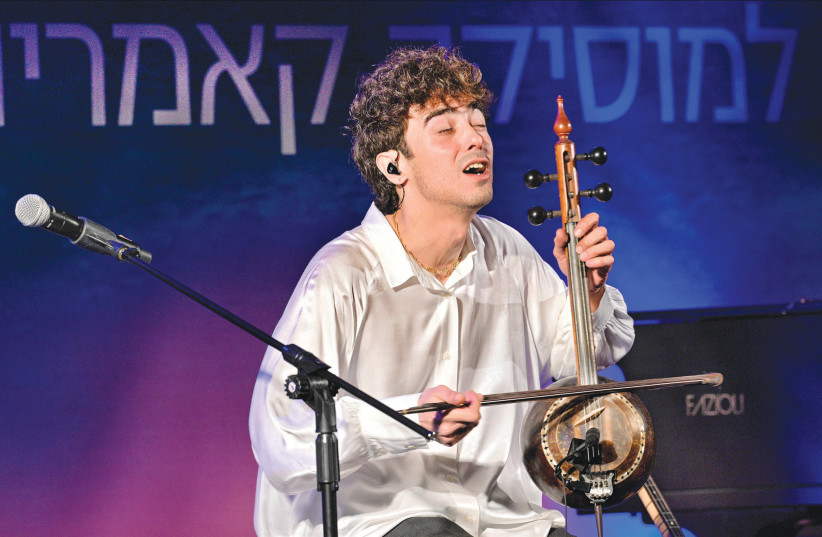Fans of jazz music have long been accustomed to encountering all kinds of sounds, styles and even genres filtering through festival programs. Eclecticism seems to be taking hold on the classical music front, too. Certainly, that was the case with this year’s Eilat Chamber Music Festival, which ended down south, on Saturday.
Most of the concerts I caught attracted decent attendances but none more than the show by celebrated kamancheh (spike violin) player Mark Eliyahu. Eliyahu is well known to the world music crowd and the mass appeal ethnic sector seems to be his primary avenue of artistic and entertainment expression these days.
That was the unmissable impression one got from his appearance in Eilat, when he teamed up with longtime sparring partner keyboardist, synthesizer player and vocalist Haim Weiss. The Tarshish Hall venue at the Dan Eilat Hotel was a standing-room-only affair. As usual, Eliyahu, who oozes X-factor appeal on stage, unfurled his mastery of the instrument he learned to play in Azerbaijan, where he spent the first seven years of his life before making aliyah and which he has used to such great effect all over the globe for a couple of decades now. That includes a lengthy berth with world music megastar Idan Reichel’s troupe.
Eliyahu makes for attractive viewing as he takes earnest meditative flight in spinning out his musical yarns. Then again, anyone looking for something of a purer ethnic experience would probably have been disappointed as the duo appeared to lock into emotive melodic and rhythmic grooves. There were some vocal strata that helped to add a little variety to the proceedings but by and large, this was a definitively appealing but uninspiring show in which patrons looking to have a good time got their money’s worth.
The entertainment ante was sky-high for the 5 p.m. slot on Thursday, which featured the dynamic Vision Quartet from Germany. The foursome has been around for over a decade now and has got its crowd-pleasing act down pat.

Music and culture
EVEN WITH the unavoidable absence of one of the regular violinists – Viennese fiddler Sebastian Gurtler filled in seamlessly – the players never missed a beat. The Quartet performed material from its 2021 album, Spectrum, and ran through some of the numerous cultural input that informs its work. There were Celtic-seasoned sounds in there, and Latin American, bluesy, gypsy and folky material and sentiments. The string players were having fun and the audience was fully on board for the ride. There was nothing envelope-pushing about it but all four are clearly blessed with the requisite technique and technical skills, and a good time was had by one and all.
Later on the second evening, things turned more serious when Saleem Abboud Ashkar took the conductor’s podium to oversee the efforts of the Galilee Chamber Orchestra in a reading of Beethoven’s Eroica Symphony, at the more expansive Big Blue Hall.
Sadly, Berlin-based Nazareth-born Ashkar and the ensemble were at a disadvantage from the off, trying to eke out some of the gravitas and majesty required by the score in an acoustically challenging hall. Even so, the conductor seemed to be determined to ensure we heard and appreciated absolutely every note in the charts.
Ashkar, who also serves as the orchestra’s artistic director, took care to dot all the “i”s and cross every single “t” of a work that tugs powerfully on the heartstrings. There were lyrical and mellifluous passages, while some staccato excerpts appeared to be a little too on the lively side.
But, given the venue’s sound-reflection limitations, Ashkar and the orchestra did a pretty good job with a nonetheless intriguing take.
The acoustics were clearly better suited for the following evening’s visit by Gabrieli Consort and Players from the UK, conducted by Paul McCreech. The latter preceded the vocal and instrumental rendition of works by English Baroque composer Henry Purcell with some background information on Purcell’s standing in the royal court of the day and his relationship with Mary II. The concert was called Music for Queen Mary and featured odes to the queen regnant, one of which was performed at the queen's funeral, in 1694. Ironically, it was also played at the composer’s own funeral the following year.
McCreech and the ensemble are naturally well-versed in the raw material and the sensibilities of the era in question. Once again, the acoustics left something to be desired but that was no reflection on the vocalists’ and instrumentalists’ standard of delivery.
The most rewarding slot of the festival came courtesy of Israeli-born Swiss harpsichord player, bass singer and conductor Elam Rotem and his Profeti della Quinta ensemble, supported by members of the Jerusalem Baroque Orchestra. Rotem specializes in the vocal repertoire of the 16th and early 17th centuries. However, unlike the English ensemble, 38-year-old Rotem does not hide the fact that he and his colleagues are very much a product of modern times.
The convincing period instrumental and vocal performances were seasoned with contemporary energy and sensibilities, with a little choreography thrown in for good measure. There was even a modicum of humor to the rendition of the Joseph and his Brothers oratorio based on a biblical Hebrew text.
